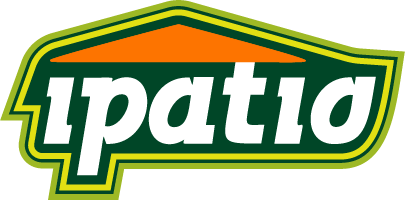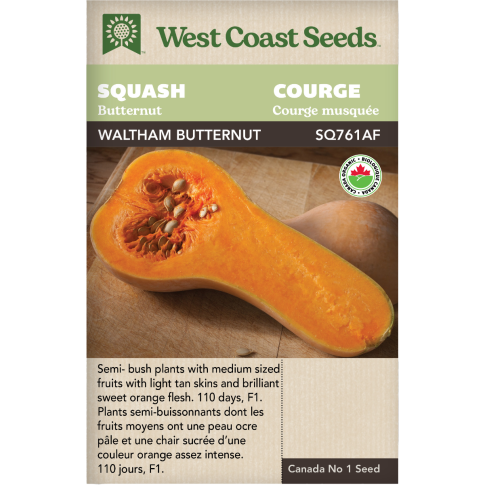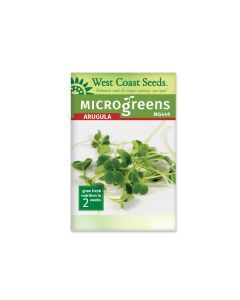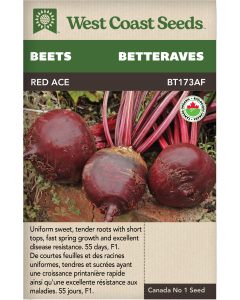Be the first to review this product
PRODUCT DETAILS
C. moschata. Waltham Organic butternut squash seeds are CERTIFIED ORGANIC! The extremely vigorous vines of this 1970 All America Selections Winner produce uniform butternut squash fruits with creamy, rich, dry, yellow-orange flesh under smooth tan skins. Waltham sets the standard for butternut squashes, and can store for as long as six months. Expect 4 to 5 fruits per plant, each measuring 23cm (9") long, with thick flesh and small seed cavities. Allow the fruits to ripen completely on the vine, and then give them a quick wipe down with some weak bleach solution to kill any bacteria on the skins. Store in a cool, dry place.
Matures in 110 days. (Open-pollinated seeds)
- Creamy, rich, dry, yellow-orange flesh
- Can store for as long as 6 months
- Extremely vigorous vines
- Open-pollinated seeds
- Matures in 110 days
All About Waltham Organic
Latin
Summer & Winter Squash: Cucurbita maxima, C. pepo, & C. moschata. Specialty Squash: Momordica charantla, Luffa acutangula.
Family: Cucurbitaceae
Difficulty
Easy, but all squash plants take up space, and some can be huge.
Season & Zone
Season: Warm season
Exposure: Full sun
Timing
Direct sow or transplant in late spring once the soil is warm. For transplants, start seeds indoors during the first two weeks of May. Optimal soil temperature: 25-35°C (77-95°F). Seeds should germinate in 7-14 days.
Starting
Sow seeds 2cm (1″) deep. Sow 3 seeds in each spot where you want a plant to grow, and thin to the strongest plant. Space summer squash 45-60cm (18-24″) apart in rows 90-120cm (36-48″) apart. Give winter squash and pumpkins even more room with a minimum of 90-120cm (36-48″) apart in rows 120-180cm (48-72″) apart.
Growing
Ideal pH: 6.0-6.8. These big plants need lots of food. Use 1 cup of complete organic fertilizer worked into the soil beneath each plant. All squash grow male flowers first, at later female flowers. The female flowers have tiny fruits at the base of their petals and require pollination by bees mostly. Incomplete pollination often happens at the beginning of the season, and results in misshapen fruits that are withered at the blossom end. Just discard these damaged fruits before they begin to rot. Encourage bees to visit the garden by growing Phacelia, sunflowers, or buckwheat for improved pollination.
Harvest
Summer Squash: Pick when small, if fruit gets big the plant stops producing. Check the plants regularly.
Winter Squash: Fruit is ripe if your thumbnail doesn’t mark the skin and the stem is dry and brown. Cut the stem about 4cm (2″) from the fruit. Squash survive a light frost, but store better if harvested before frost.
Storage:
Field-cure for 10 days in the sun, or cure indoors in a warm room for 4 or 5 days. To prevent mould sponge the skins with a solution of 10 parts water to 1 part chlorine bleach. Store at 10-15ºC (50-60ºF) with low humidity with good air circulation. Try on a shelf in the garage.
Seed Info
In optimal conditions at least 80% of seeds will germinate. Usual seed life: 2 years. Per 100′ row: 180 seeds, per acre: 15M seeds.
Diseases & Pests
Bacterial wilt (Erwinia tracheiphila) – Remove and destroy infested plants. If striped or spotted cucumber beetles appear, control as early as possible. Powdery mildew – avoid wetting foliage if possible. Water early in the day so that above ground parts of the plants dry as quickly as possible. Avoid crowding plants and eliminate weeds around plants and garden area to improve air circulation. Viral disease – remove and destroy entire infested plant along with immediately surrounding soil and soil clinging to roots.
Companion Planting
Companions: corn, lettuce, melons, peas, and radish. Avoid planting squash near Brassicas or potatoes. Borage is said to improve the growth and flavour of squash. Marigolds and nasturtium repel numerous squash pest insects.
| Brand | West Coast Seeds |
|---|---|
| Manufacturer Part Number | SQ761AF |
| UPC | 687704072672 |
| Family | Squash |
| Group | Butternut |
| Days to Maturity | 110 |
| Certified Organic | Yes |
| Heirloom | No |
| Open Pollinated | Yes |
| Hybrid | No |
| Pack Options | A pack |
| Package Language | Bilingual |
| Shipping Type | Seeds |














Login and Registration Form